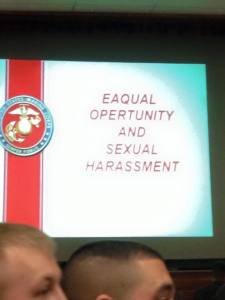For your calendar
At the 2015 Innocence Summit, the nation’s leading prosecutors, researchers, defense attorneys, citizen activists, exonerees, and others will come together to debate how the Innocence Movement can overcome old obstacles and achieve new successes.
Theme: Forging Best Practices for Innocence Reform
Why: Because our criminal justice system needs to apply evidence-based best practices in order to stop wrongful convictions and restore the presumption of innocence
NIMJ writing awards
Please see the NIMJ announcement of the Barry and Jenkins writing awards at this link.
Kevin J. Barry Award for Excellence in Military Legal Studies.
This award recognizes an outstanding article published in an academic or professional journal, and honors the memory of an outstanding scholar and peerless advocate of reform: Kevin J. Barry, a founder and longtime director of NIMJ.
NCIS chief interviewed
Navy Times recently interviewed the Director of NCIS. Here is a question I found interesting and thought I’d share.
Q. There have been a number of recent cases in which inspector general investigations concluded NCIS agents weren’t following procedures. What are you doing to improve that?
A. I think if we have needed to we have tightened up quite a bit. I will give you an example: Some of the things we were cited for were actually minor deficiencies or violations of our own internal policies.
Up periscope under the radar
On 29 August 2014, the Inspector General, U.S. Department of Defense issue a report, Evaluation of DoD Compliance with the Sex Offender Registration and Notification Act.
In connection with the U.S. sex offender registry’s, there is now quite a robust amount of research that seems to label the idea as ineffective. The worst of the worst are likely to commit similar crimes whether or not they are on a registry and under watch. Fairly regular news reports provide anecdotal support for such a conclusion. As for the rest, statistics show that sex offenders have a much lower recidivism rate than non-sex offenders. In addition, there is a question about the basic effectiveness of such laws; as reported in Science Daily, and The Economist, and in a study conducted by the U.S. Department of Justice, National Criminal Justice Reference Service, in a limited study of South Carolina’s laws. The criticisms do not suggest no value to such registry’s, rather a more precise and reasoned approach. You might read a pro-con discussion about sex offender registration policy sponsored by the Federalist Society. Science Daily notes,
Thinking upgrade
“Adolescents, more than adults, tend to discount the future and to afford greater weight to the short-term consequences of decisions.”
Kim Taylor-Thompson, States of Mind/States of Development, 14 STAN. L. & POL’Y REV. 143, 154 (2003).
How often do I think of this principle (cited to in The Virginia Lawyer, and United States v. Berry), when a client wants to upgrade their discharge.
Test
Test
Military justice changes coming?
From DefenseNews: Senate Armed Services Committee Chairman Sen. Carl Levin, D-Mich., told reporters on Tuesday that Senate and House Armed Services Committee leaders want to finish the compromise version of the 2015 National Defense Authorization Act (NDAA) by Friday. There will likely be no floor amendments, Levin said, largely because there are few remaining days in the legislative calendar.
Light-heavy-worth the read
I came across a piece entitled, “We Love the Pentagon’s ‘Encylopedia of Ethical Failure’” which is on medium.com.
The piece notes what we have all seen that the last few years have seen many ethical challenges for the military. Likely we know more about the specific cases because of The Internet and Google.
Individually, the cases are all bad news. The good news is that authorities often catch and punish government cheats, thieves and frauds. Penalties for ripping off the American taxpayer range from huge fines to hard time in prison.
Making an objection or motion
I was reading Unwashed Advocate today, and thought I would repeat his good advice on how best to make a motion or objection at trial. I have a couple of additional thoughts, but otherwise his is good advice. He says, and I quote extensively:
However, when it comes to making a motion, or stating an objection, I’ve always followed this format.
A. Object/Make Motion
 Court-Martial Trial Practice Blog
Court-Martial Trial Practice Blog











